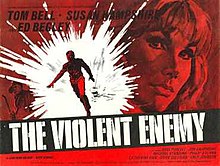The Violent Enemy
 From Wikipedia the free encyclopedia
From Wikipedia the free encyclopedia
| The Violent Enemy | |
|---|---|
 | |
| Directed by | Don Sharp |
| Written by | Edmund Ward |
| Based on | novel "A Candle for the Dead" by Hugh Marlow (Jack Higgins) |
| Produced by | Wilfred Eades executive William Gell |
| Starring | Tom Bell Susan Hampshire Ed Begley Noel Purcell |
| Cinematography | Alan Hume |
| Edited by | Thom Noble |
| Music by | John Scott (as Patrick John Scott) |
Production companies | |
| Distributed by | Monarch Film Corporation London Independent Producers |
Release date | May 1969 |
Running time | 94 minutes |
| Country | United Kingdom |
| Language | English |
| Budget | £250,000[1] |
The Violent Enemy is a 1968 film directed by Don Sharp and starring Tom Bell, Susan Hampshire, Ed Begley, and Noel Purcell. The plot concerns an IRA plot to blow up a British power station.[2][3]
Premise[edit]
IRA bomb expert Sean Rogan escapes from prison, and is reluctantly recruited into a scheme by IRA leader Colum O'More to blow up a British electronics factory back in Ireland. Rogan wants a peaceful life but O'More insists.
Rogan is given Hannah Costello to assist him. Inspector Sullivan is suspicious of Rogan.
Cast[edit]
- Tom Bell – Sean Rogan
- Susan Hampshire – Hannah Costello
- Ed Begley – Colum O'More
- Noel Purcell – John Michael Leary
- Jon Laurimore – Austin
- Michael Standing – Fletcher
- Philip O'Flynn – Inspector Sullivan
Original Novel[edit]
The film was based on the 1966 novel A Candle for the Dead by Hugh Marlow (better known as Jack Higgins). The Observer called it "fast and exciting".[4] The sale of the movie rights enabled Higgins to quit teaching and write full time. The book would subsequently be reissued as The Violent Enemy by Jack Higgins.[5]
Production[edit]
Don Sharp had previously worked with the producers on Taste of Excitement (which would be released after this film). He says the original title of the film was Candle for the Dead.[6] The title was changed to Came the Hero when filming began in Waterford in October 1968 and was finished by December.[1][7] Sharp says it had a "nice cast" with Begley being "marvellous... it was a very good movie to make. I loved filming in Ieland. Tom Bell was marvellous".[6]
Release[edit]
Sharp says "everyone was delighted" with the film but just as it was released in 1969, IRA activity started up again causing the film to be pulled.[6]
Critical reception[edit]
The Monthly Film Bulletin called it a "moderately interesting if not particularly convincing melodrama".[8]
Sky Movies described it as "one of only a handful of British films to deal with the troubles in Ireland. Played as a melodrama, the film is efficiently directed by action specialist Don Sharp. Tom Bell has the right air of disillusionment about him as the IRA man who's learned moderation in a British jail".[9] The Radio Times noted, "it's efficiently made, if unsurprising, and familiar American actor Ed Begley is worth watching as the fanatical Irish mastermind behind the scheme."[10]
The Independent said "The sum of all these substantial parts is less than a masterpiece. Too much of a hint of 'Oirish' accents among English actors. Too much talk of The Cause. Too little movement in the clock above Leary's bar, which is forever stuck at seven minutes past nine. Still it fills an idle hour and a half well enough."[11]
References[edit]
- ^ a b "Filming starts in Waterford. Was shot in Ardmore Studios, Bray, Co. Wicklow and on location in Enniscorthy, Co. Wexford". The Irish Times. 12 October 1968. p. 8.
- ^ The Violent Enemy at BFI
- ^ Vagg, Stephen (27 July 2019). "Unsung Aussie Filmmakers: Don Sharp – A Top 25". Filmink.
- ^ CRIMERATION Richardson, Maurice. The Observer 14 Aug 1966: 18.
- ^ Davison, Phil (17 April 2022). "Jack Higgins: Best-selling author of The Eagle Has Landed". Independent.
- ^ a b c Sharp, Don (2 November 1993). "Don Sharp Side 5" (Interview). Interviewed by Teddy Darvas and Alan Lawson. London: British Entertainment History Project. Retrieved 14 July 2021.
- ^ Aznavour Signs 2-Year Pact Martin, Betty. Los Angeles Times 12 Oct 1968: c9.
- ^ VIOLENT ENEMY, The Monthly Film Bulletin; London Vol. 36, Iss. 420, (Jan 1, 1969): 178.
- ^ "The Violent Enemy".
- ^ John Gammon. "The Violent Enemy". RadioTimes.
- ^ "Forgotten films... in familiar settings". Independent. 11 October 2011.
External links[edit]
- The Violent Enemy at IMDb
- The Violent Enemy at BFI
- The Violent Enemy at Letterbox DVD